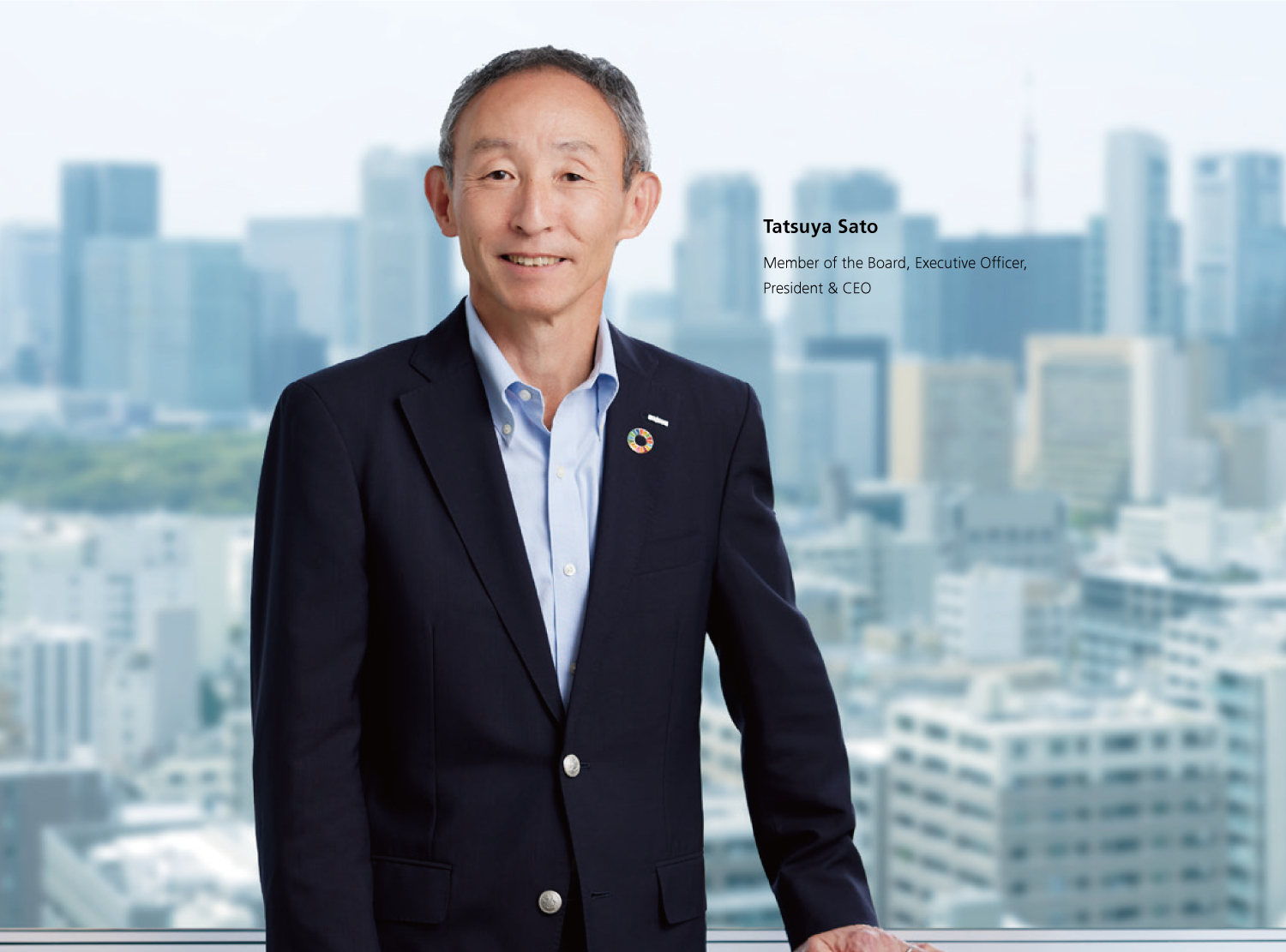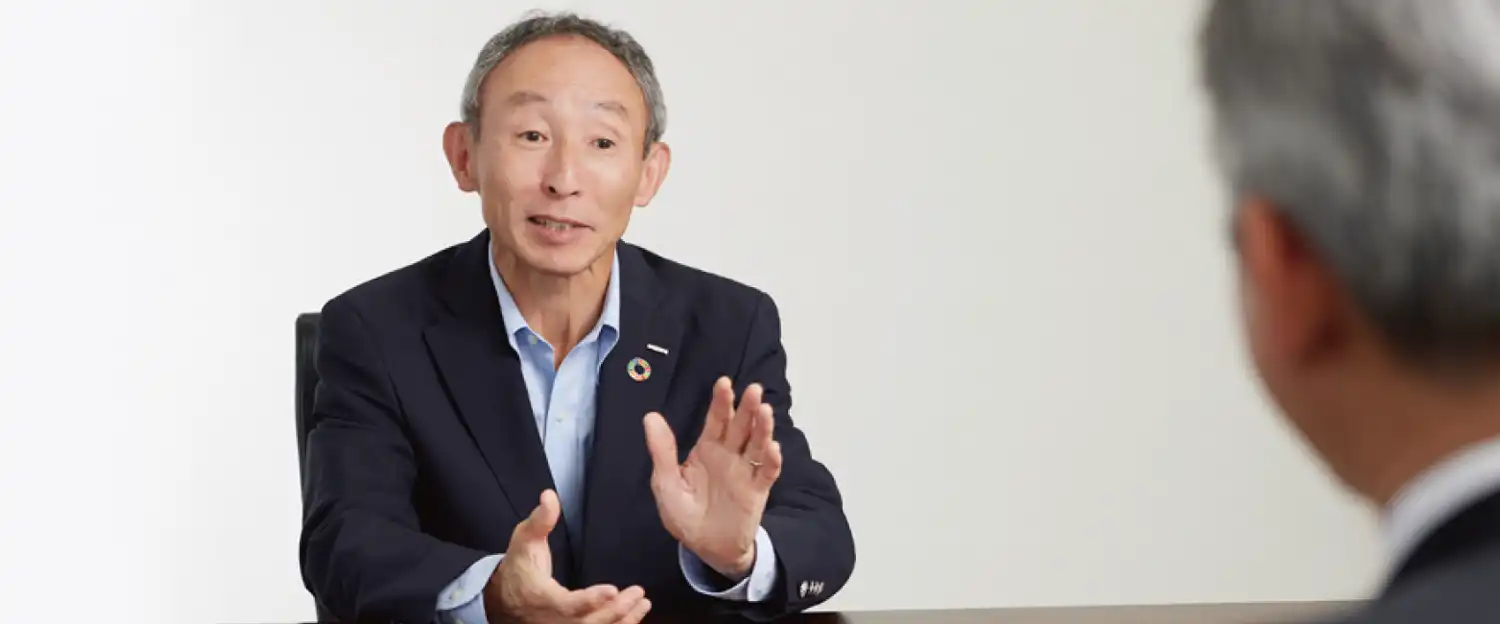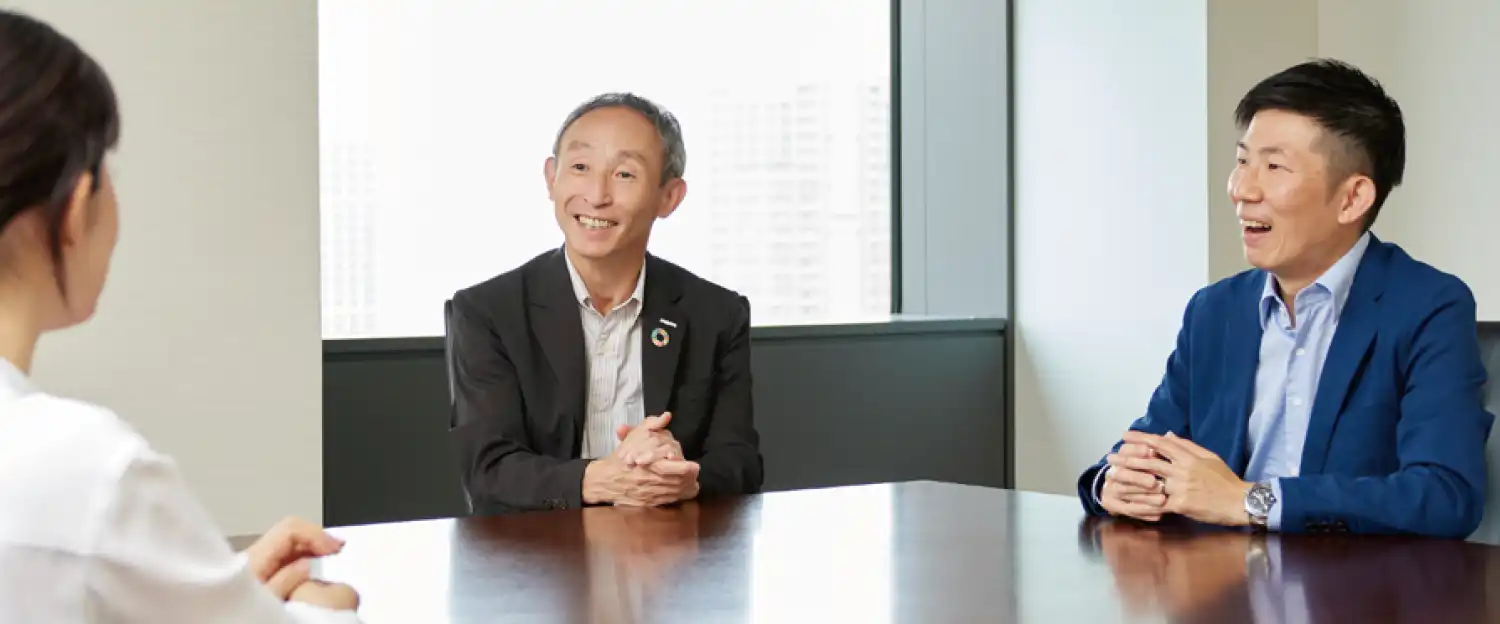CEO message

We must each take on challenges. This will be the driving force behind the Company’s revival and growth.
Realizing Revival and Growth
It has been a year and a half since I was appointed member of the board, executive officer, president & CEO on April 1, 2022. From the very beginning, I have always emphasized the importance of being prepared to take on responsibility in any given situation. The essence of this mindset is to constantly think about what can be done to achieve results and to take dedicated action. I firmly believe this mindset is crucial at this moment. The Company announced the Sixth Medium-Term Business Plan in May 2021. We revised the plan in November 2022, because significant changes in the external environment surrounding the edible oil industry had led to major discrepancies between the plan’s targets and our actual situation. For the background and specific details on our revisions to the Sixth Medium-Term Business Plan, please refer to “Revising the Sixth Medium-Term Business Plan” on page 18 and “Specific Initiatives when Revising the Sixth Medium-Term Business Plan” on page 22.
To reach the numerical targets set forth in Revising the Sixth Medium-Term Business Plan and realize the Company’s revival and growth, I will personally take on challenges, and I encourage our employees to do the same. I believe such efforts will inevitably produce positive results. I ask for your ongoing support of the Group’s endeavors.

Transforming Our Corporate Culture into One That Embraces Challenges
To overcome the challenges the Company faces and achieve revival and growth, we all need to embrace new challenges— management and employees alike. I aim to transform the corporate culture to make it easier for everyone to take on new challenges. The company has a rather mild and reserved temperament, which may have worked against it in a difficult business environment. However, we have many highly capable employees, and as the president, it is my role to encourage them and instill in them the courage to take on challenges.
Transforming a corporate culture is an ongoing challenge. To foster a culture of continuous improvement, I have been visiting various departments and locations, conducting smallscale discussions, and engaging actively in communication with employees. We also provide an online forum for more extensive communication every quarter. Here, we share updates on Company performance, overall goals, our current status, and challenges. We respond to employees’ questions and feedback by directly explaining the thoughts of the management team, including myself. I believe this sort kind of communication with employees will help transform our corporate culture, and I am actively working to make it happen.
I always communicate three things to my employees. The first is the importance of taking on challenges, as I have already mentioned. That said, just telling someone to take on challenges is not motivational. Challenges must be accompanied by a fair system of evaluation. I explicitly state that I will not hold employees responsible if they take on a bold challenge and happen to fail. This applies to medium- to long-term challenges, however; short-term is a different matter. For example, monthly sales plans affect financial and profit planning, so rather than viewing these as challenges, employees must take responsibility for the numbers.
Second, when setting goals, I suggest employees aim for slightly higher targets. Let us take the example of a factory that produces 100,000 tons of products. As operational proficiency improves, the factory becomes capable of producing 110,000 tons of products.
When setting goals for the following year, should the person in charge base the plant’s target on the designed production capacity of 100,000 tons or the current production level of 110,000 tons and set even higher targets? Some might consider achieving the target of 100,000 tons to be sufficient. Others might decide that, as the plant is already producing 110,000 tons, an even higher production target of 120,000 tons could be met by increasing efficiency. While this is just an analogy, I personally appreciate people who set higher goals, such as aiming for 120,000 tons, rather than settling for current achievement levels. Setting ambitious goals and taking on challenges can make a significant difference to the actual growth achieved. I have experienced this personally. Without a doubt, I believe that by gradually increasing the number of employees willing to take on challenges, the Company will undergo a transformation.
Third, I encourage employees to speak up when they notice any areas that could be improved or have other suggestions to make. For example, utilization rates at the Company’s factories are not always high. Improving those rates makes us more competitive, as costs per unit decline. I welcome proposals for making improvements; employees need not fear making changes to existing approaches to company-wide challenges. I encourage healthy competition within the organization. While I understand that employees may have been reluctant to propose improvements in the past, I would like to reiterate that we want you to raise your hand and identify areas for improvement and make suggestions.
My sense is that the Company’s employees tend to be subdued and lack initiative when it comes to changes and challenges. That said, in the year and a half that have elapsed since taking office, I have noticed a change in our internal atmosphere. I would like to encourage people to actively propose ideas for positive change, and I hope that increasing the number of people taking advantage of internal transfers will provide them with more opportunities. Recently, we have been promoting young managers. I think this signals that individuals can excel based on their abilities, regardless of age. While we do not necessarily favor younger employees, we aim to change the culture of the Company and the mindset of our employees by conducting evaluations based on equal opportunities and abilities.
Thoughts on Our Corporate Philosophy and Organizational Reform
The organization must always return to and share our vision. Without a shared understanding, we risk losing our way. Employees need to be able to confirm what the Company values and considers important, and how we should exist as a company. We have established a corporate philosophy to convey these values. I think our vision and our values and purpose are very well expressed and easy for diverse stakeholders to understand. The Company places great importance on its corporate philosophy, and I make it a priority to instill the corporate philosophy when I travel to all the Company’s locations.
One issue we face with our corporate philosophy lies in making it easily understandable in other languages. Our corporate philosophy has been formulated with an emphasis on being easy to read and understand in Japanese. Achieving the same level of clarity when translating the philosophy into other languages can be difficult. Going forward, the Japanese market will undergo significant changes as its demographics are affected by an aging population and declining birthrate. Consumer purchasing behavior and preferences are likely to change as a result. To achieve sustainable growth, the Company will need to expand earnings in overseas markets. To ensure that people in other countries also understand and appreciate the Company’s corporate philosophy, we will need to address this issue. To do so, we will create a forum for discussion within the Company.
We introduced organizational reforms on July 1, 2023. These reforms reorganize the Company by function and introduce a new CxO system to clarify executive responsibilities and accelerate the implementation of the structural reforms, growth strategies, and investment strategies outlined in the revised Sixth Medium-Term Business Plan. With the CxO system, we seek to ensure that responsible individuals commit to executing the necessary tasks and take accountability for the numerical targets and goals we have set.
Since assuming the position of president, I have sometimes had to revise our performance forecasts downward. As one aspect of the Company’s culture, when forecasts are lowered, the previous plan is reset, and we tend to lose clarity about the decisions that were made initially. Instead of this reset, I aim to maintain responsibility for following through on the decisions we have made. For this reason, we have decided to implement the CxO system, which makes the people in charge responsible for delivering results.
The CxO system covers three domains: earnings, growth, and infrastructure. The COO plays an instrumental role in these areas, with particular responsibility for earnings. The CTO is responsible for infrastructure optimization, including the consolidation of production sites and the elimination of unprofitable businesses. For example, for a business we are cultivating and that requires upfront investment, our goal is for it to become profitable within three to five years. Under the leadership of the COO, we aim to establish a structure that allows us to commit to the results of such businesses. The margarine business is one example where we hope to enhance competitiveness by transferring production overseas. Doing so involves aspects of technology, production, and quality. The CTO will commit to delivering results in businesses such as these where technical elements have a significant impact on earnings.
Previously, we operated under two business units: Oils and Fats and Specialty Food Products. However, as part of our organizational reform, we have decided to reorganize according to function. Our businesses differ in terms of amount of sales, profitability, and stage of growth, and we have reorganized to allow each department to fully utilize its capabilities, rather than positioning them as parallel business divisions. In particular, we have established the Overseas Business Department as a dedicated department to prepare for future expansion of our business in North America and the ASEAN region. Previously, business units handled their overseas operations separately.
The business environment has been difficult for the past several years, but I believe we are gradually returning to a more stable state of improvement. Under this environment, in FY2023 the Company will focus on taking the first steps toward revival and growth. I sincerely appreciate your continued understanding and support for the J-Oil Mills Group.
Cultivating Our “Communication Brand”
The Company introduced J-OIL as a “communication brand” in April 2021. I think of a “communication brand” as being the face of a company. By establishing a strong “communication brand” and increasing our brand recognition, we will more frequently become the company of choice for our customers. Cultivating our “communication brand” is important, as it nudges customers to choose our products and gives individuals the impetus to work at the Company.
The difficult business environment over the past two years has meant we were unable to allocate sufficient management resources to cultivate our “communication brand”. We emphasize creating joy for people, society, and the environment through the Company's corporate philosophy which states our vision.
The Company aims to enhance its brand image by providing unique products that demonstrate a high level of environmental consciousness, show our determination to take on challenges, and address social issues. To achieve this, going forward we are committed to actively fostering a “communication brand.”

President engaging in dialogue with young employees
Sustainability
Our Company operates in the food-related domain and relies on plants from nature as its primary source of ingredients. As a result, we recognize that disruptions to the Earth’s environmental balance threaten our own viability. Accordingly, we believe strongly that efforts to address sustainability issues are essential for us as a sustainable entity.
I am strongly committed to enhancing the Company’s medium- to long-term sustainability. At the same time, however, I cannot sacrifice other short-term key priorities by solely focusing on sustainability. I believe in striking a balance within the organization, without neglecting either aspect, to help improve corporate value.
For FY2023, the Company has revised its materiality. We have narrowed our materiality down to four key priorities, two of which relate to business strategy and two others that relate to the business platform. By focusing on these key priorities, we aim to ensure that all employees recognize the importance of working towards them collectively.
Promoting sustainability means more than just knowing that someone in a certain department of the Company is responsible for it. Instead, it is important for all employees to recognize that sustainability is their own responsibility and that they must fulfill their own roles to promote sustainability. To achieve this, sustainability needs to be incorporated specifically into our operations and evaluations. We have begun by linking executive remuneration to sustainability. Going forward, we will incorporate materiality or sustainability into the setting of organizational, departmental, and team goals. We believe this initiative is important for making sustainability more than just a concept, but to enhance related executional capabilities.
